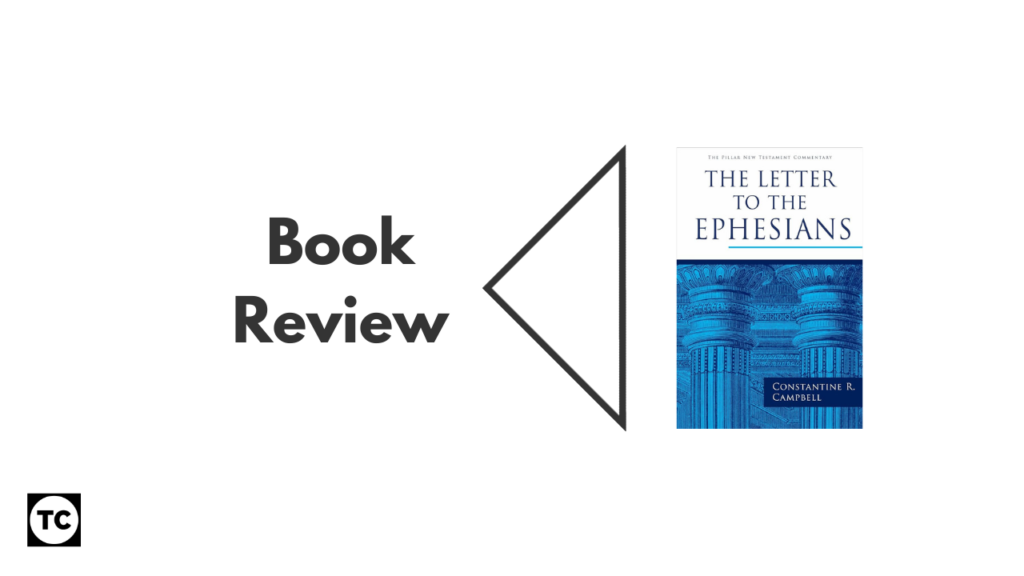Reviewing commentaries is a tricky business – particularly for me as a generalist, and an in-publisher editor of commentaries! I tend to offer my review based on the format and content of the volume, and it’s utility or otherwise to preachers and pastors. Occasionally I’ll digress into particularly theological or stylistic quirks.

The Pillar New Testament Commentary series (henceforth PNTC) is an interesting series – and one I appreciate, not least for one of it’s inaugural volumes, on John’s Gospel, by series editor D. A. Carson. The series was rocked a few years ago when a couple of volumes had to be withdrawn – and this year saw the replacement of the volume on Ephesians. Constantine R. Campbell, who dedicates this volume to it’s predecessor’s author, Peter T. O’Brien, has written an impressive commentary: it is readable, concise, and shorter than the volume it replaces, whilst focusing on some different theological themes and building on the authors’ work on Union with Christ, in particular.
I would imagine most readers of my blog, and indeed commentary reviews generally, will be aware of the structure that PNTC follows, so I will be brief in summarising it. Each pericope – or passage of text – is printed in English (Here the CSB translation, interestingly enough), followed by an un-signposted introductory paragraph, and then verse-by-verse exposition. A lot of Campbell’s research, scholarship and text critical/language observations can be found in the footnotes – which on some pages can be nearly 50% of the printed area! There are a trio of excursuses, on ‘The Heavens’, ‘Grace and Faith’, and ‘Wives and Husbands. The first of these covers a theme woven throughout the Epistle, the last is a judicious treatment of the submission text in and around Ephesians 5 – which many readers may well turn to in order to decide what they think about the commentary.
After xxix pages of introductory matter including the bibliography, Campbell devotes 31 pages to his introduction, and around 270 pages to the commentary ‘proper’. The volume closes with the expected – and useful – indices of Subjects, Authors, Scripture References and Early Extrabiblical Literature. Eerdmans, as ever, have done a nice job with production – though I did wonder if the paper used is a little thinner and less chalky than some, or at least my other PNTC volumes. Campbell’s division of the book in terms of a structure to Ephesians is relatively straightforward, with 2-3 pericopes per chapter. The relatively brief introduction includes a brief but firm discussion of authorship, one aspect of which I appreciated Campbell’s clarity on was Ephesians’ relationship to Colossians: “Even if it can be demonstrated that Ephesians relies on Colossians – and this question is more complex than it might seem – it does not prove anything about authorship” (p. 9). Another highlight of the introduction is the ‘Themes’ that Campbell identifies as core to Ephesians – which he picks up throughout the commentary, in a way that makes this a more theological commentary than might be expected from the verse by verse approach, and this is to the author’s credit, in my view.
Campbell’s treatment of Ephesians is thoroughgoingly Christ-centred, echoing Paul’s passion: “The will of God to bless his people is accomplished through Christ” (p. 44), and the Pauline program of discipleship: “In true humility that emulates Christ, believers are able to treat others with gentleness, patience, and forbearance” (p. 165); as well as relating to the tricky topic of submission: “The slaves’ relationship to Christ is the source of their conduct towards their human masters” (p. 270). This all reinforces one of the aforementioned themes, Union with Christ, which is very helpful in understanding what is going on in Ephesians in a variety of ways (and perhaps differs from Colossians, where I would suggest a key theme is the Supremacy of Christ, related to but distinct from, Union). A key ‘thing’ that relates to Union with Christ is also unity within the body of Christ, the church – something that Ephesians speaks to, and Campbell echoes part of the challenge of the New Testament, “Whilst divisions and fractures remain, the witness of the church is not all it could be” (p. 185).
In my view, this is an excellent mid-weight commentary on Ephesians, doing some of the technical work that a longer one like Cohick’s NICNT does, but in a package that is readable and concise. It would pair nicely with, for example, more pastoral work like John Stott’s evergreen Bible Speaks Today volume, or Bitrus A. Sarma’s Blessed New Humanity in Christ – I’m planning on reading Bock’s new TNTC next year, which I think might be quite similar in length to this PNTC volume. Campbell is to be commended for writing a thoroughgoingly theological, eminently readable, and calm commentary on Paul’s letter to the Ephesians.
5/5
Leave a Reply